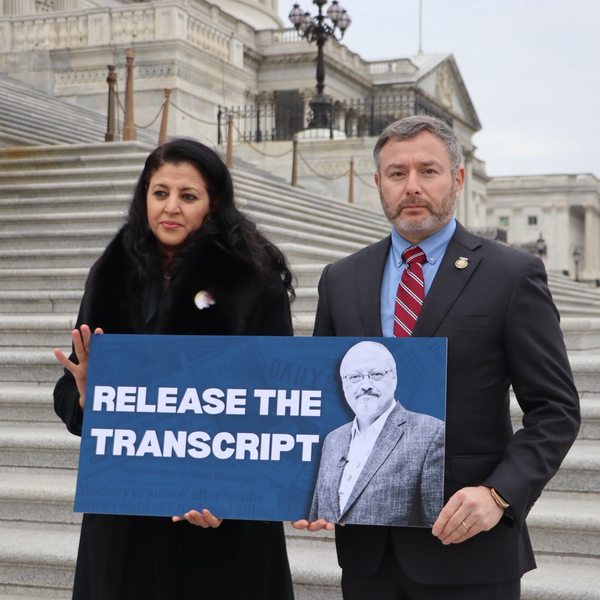
Salma Al-Shehab, a 34-year-old Leeds University graduate student and mother of two, spent more than four years in prison for social media posts.
Salma al-Shehab Freed After Serving Years in Saudi Prison for Tweets
One advocate stressed that al-Shehab's "full freedom must now be granted, including the right to travel to complete her studies" at Leeds University in England.
Human rights defenders on Monday welcomed the release of Salma al-Shehab—who was once sentenced to 34 years in prison after she amplified social media posts promoting women's rights—and called on authorities to restore her right to travel so she can return to her doctoral studies at Leeds University in England.
Al-Shehab, a 36-year-old mother of two and women's rights activist, was arrested in 2021 while vacationing in Saudi Arabia and imprisoned for nearly 10 months in solitary confinement before being tried for reposting messages from activists on the social media site then known as Twitter.
"Saudi Arabia's authorities must now ensure she is not subjected to a travel ban or any further punitive measures."
In March 2022, the Specialized Criminal Court (SCC) sentenced al-Shehab to six years behind bars. However, the prosecution appealed and the SCC extended her sentence to 34 years, sparking international condemnation and growing calls for al-Shehab's release. Al-Shehab's sentence was subsequently reduced twice, first to 27 and then to four years following a 2024 retrial. At one point, al-Shehab and seven other imprisoned women went on a hunger strike protest.
"Salma al-Shehab's ordeal in prison is finally over," Amnesty International Middle East researcher Dana Ahmed said in a statement Monday. "For more than four years she has been subjected to one gross injustice after another including at one point being handed an egregious 34-year prison sentence for her social media posts."
"She spent almost 300 days in prolonged solitary confinement, was denied legal representation, and was then repeatedly convicted on terrorism charges and handed a decadeslong sentence," Ahmed added. "All just because she tweeted in support of women's rights and retweeted Saudi women's rights activists. Saudi Arabia's authorities must now ensure she is not subjected to a travel ban or any further punitive measures."
While there have been improvements during the de facto rule of Saudi Crown Prince Mohammed bin Salman—women can now drive, get their own passports, travel abroad, and live independently without the permission of a male guardian, to name but a few developments—critics contend that the kingdom remains one of the world's most repressed societies, especially for women and religious minorities. Al-Shehab is Shia Muslim, a group that has long faced severe discrimination in the Sunni-majority kingdom.
Human rights advocates called on Saudi authorities to free other women imprisoned for their online activism.
"While today is a day to celebrate Salma's release, it's also an opportunity to reflect on the many others serving similarly lengthy sentences in Saudi Arabia for their activities online," said Ahmed. "This includes other women such as such as Manahel al-Otaibi, and Noura al-Qahtani, jailed for speaking out for women's rights, and Abdulrahman al-Sadhan, jailed for 20 years for satirical tweets."
"We urge the Saudi authorities to immediately release them and end their relentless crackdown on the right to freedom of expression once and for all," Ahmed added.
An Urgent Message From Our Co-Founder
Dear Common Dreams reader, The U.S. is on a fast track to authoritarianism like nothing I've ever seen. Meanwhile, corporate news outlets are utterly capitulating to Trump, twisting their coverage to avoid drawing his ire while lining up to stuff cash in his pockets. That's why I believe that Common Dreams is doing the best and most consequential reporting that we've ever done. Our small but mighty team is a progressive reporting powerhouse, covering the news every day that the corporate media never will. Our mission has always been simple: To inform. To inspire. And to ignite change for the common good. Now here's the key piece that I want all our readers to understand: None of this would be possible without your financial support. That's not just some fundraising cliche. It's the absolute and literal truth. We don't accept corporate advertising and never will. We don't have a paywall because we don't think people should be blocked from critical news based on their ability to pay. Everything we do is funded by the donations of readers like you. Will you donate now to help power the nonprofit, independent reporting of Common Dreams? Thank you for being a vital member of our community. Together, we can keep independent journalism alive when it’s needed most. - Craig Brown, Co-founder |
Human rights defenders on Monday welcomed the release of Salma al-Shehab—who was once sentenced to 34 years in prison after she amplified social media posts promoting women's rights—and called on authorities to restore her right to travel so she can return to her doctoral studies at Leeds University in England.
Al-Shehab, a 36-year-old mother of two and women's rights activist, was arrested in 2021 while vacationing in Saudi Arabia and imprisoned for nearly 10 months in solitary confinement before being tried for reposting messages from activists on the social media site then known as Twitter.
"Saudi Arabia's authorities must now ensure she is not subjected to a travel ban or any further punitive measures."
In March 2022, the Specialized Criminal Court (SCC) sentenced al-Shehab to six years behind bars. However, the prosecution appealed and the SCC extended her sentence to 34 years, sparking international condemnation and growing calls for al-Shehab's release. Al-Shehab's sentence was subsequently reduced twice, first to 27 and then to four years following a 2024 retrial. At one point, al-Shehab and seven other imprisoned women went on a hunger strike protest.
"Salma al-Shehab's ordeal in prison is finally over," Amnesty International Middle East researcher Dana Ahmed said in a statement Monday. "For more than four years she has been subjected to one gross injustice after another including at one point being handed an egregious 34-year prison sentence for her social media posts."
"She spent almost 300 days in prolonged solitary confinement, was denied legal representation, and was then repeatedly convicted on terrorism charges and handed a decadeslong sentence," Ahmed added. "All just because she tweeted in support of women's rights and retweeted Saudi women's rights activists. Saudi Arabia's authorities must now ensure she is not subjected to a travel ban or any further punitive measures."
While there have been improvements during the de facto rule of Saudi Crown Prince Mohammed bin Salman—women can now drive, get their own passports, travel abroad, and live independently without the permission of a male guardian, to name but a few developments—critics contend that the kingdom remains one of the world's most repressed societies, especially for women and religious minorities. Al-Shehab is Shia Muslim, a group that has long faced severe discrimination in the Sunni-majority kingdom.
Human rights advocates called on Saudi authorities to free other women imprisoned for their online activism.
"While today is a day to celebrate Salma's release, it's also an opportunity to reflect on the many others serving similarly lengthy sentences in Saudi Arabia for their activities online," said Ahmed. "This includes other women such as such as Manahel al-Otaibi, and Noura al-Qahtani, jailed for speaking out for women's rights, and Abdulrahman al-Sadhan, jailed for 20 years for satirical tweets."
"We urge the Saudi authorities to immediately release them and end their relentless crackdown on the right to freedom of expression once and for all," Ahmed added.
Human rights defenders on Monday welcomed the release of Salma al-Shehab—who was once sentenced to 34 years in prison after she amplified social media posts promoting women's rights—and called on authorities to restore her right to travel so she can return to her doctoral studies at Leeds University in England.
Al-Shehab, a 36-year-old mother of two and women's rights activist, was arrested in 2021 while vacationing in Saudi Arabia and imprisoned for nearly 10 months in solitary confinement before being tried for reposting messages from activists on the social media site then known as Twitter.
"Saudi Arabia's authorities must now ensure she is not subjected to a travel ban or any further punitive measures."
In March 2022, the Specialized Criminal Court (SCC) sentenced al-Shehab to six years behind bars. However, the prosecution appealed and the SCC extended her sentence to 34 years, sparking international condemnation and growing calls for al-Shehab's release. Al-Shehab's sentence was subsequently reduced twice, first to 27 and then to four years following a 2024 retrial. At one point, al-Shehab and seven other imprisoned women went on a hunger strike protest.
"Salma al-Shehab's ordeal in prison is finally over," Amnesty International Middle East researcher Dana Ahmed said in a statement Monday. "For more than four years she has been subjected to one gross injustice after another including at one point being handed an egregious 34-year prison sentence for her social media posts."
"She spent almost 300 days in prolonged solitary confinement, was denied legal representation, and was then repeatedly convicted on terrorism charges and handed a decadeslong sentence," Ahmed added. "All just because she tweeted in support of women's rights and retweeted Saudi women's rights activists. Saudi Arabia's authorities must now ensure she is not subjected to a travel ban or any further punitive measures."
While there have been improvements during the de facto rule of Saudi Crown Prince Mohammed bin Salman—women can now drive, get their own passports, travel abroad, and live independently without the permission of a male guardian, to name but a few developments—critics contend that the kingdom remains one of the world's most repressed societies, especially for women and religious minorities. Al-Shehab is Shia Muslim, a group that has long faced severe discrimination in the Sunni-majority kingdom.
Human rights advocates called on Saudi authorities to free other women imprisoned for their online activism.
"While today is a day to celebrate Salma's release, it's also an opportunity to reflect on the many others serving similarly lengthy sentences in Saudi Arabia for their activities online," said Ahmed. "This includes other women such as such as Manahel al-Otaibi, and Noura al-Qahtani, jailed for speaking out for women's rights, and Abdulrahman al-Sadhan, jailed for 20 years for satirical tweets."
"We urge the Saudi authorities to immediately release them and end their relentless crackdown on the right to freedom of expression once and for all," Ahmed added.

